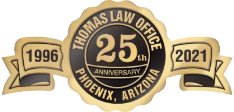
Under What Circumstances Can A Bankruptcy Trustee Object To A Discharge?
January 16, 2016
A Chapter 7 trustee can object to the discharge. Normally, it is a creditor who will object to a discharge of a particular debt. As one example, if a credit card company believes that you ran up your credit card in the months prior to the filing of your Arizona Chapter 7 bankruptcy case, that creditor could file an “adversary proceeding” (which is essentially a min-lawsuit inside your Chapter 7 bankruptcy case) against you in which that creditor would allege that you fraudulently ran up your charges, knowing that you were unable to pay them back and/or that you were headed for bankruptcy.
The judge would then hear evidence at trial and decide whether the portion of charges that were run up shortly before the filing of the Chapter 7 bankruptcy case were fraudulent as defined by federal bankruptcy law. However, a trustee can object to a discharge in certain circumstances. The most frequent circumstance is when a debtor in a Chapter 7 case refuses to cooperate with the Chapter 7 trustee or lies to the Chapter 7 trustee about something significant. The trustee can ask the bankruptcy judge to deny your discharge because of the wrongful behavior.
You would have the right to refute the Chapter 7 trustee’s positions and evidence, but if you lose, you may never again be able to apply for the discharge of all the debts in your Chapter 7 bankruptcy case. This is a severe punishment and can easily be avoided by having good legal advice from the outset. It is very important to disclose all assets and debts, to answer all questions truthfully, and to cooperate fully with the Chapter 7 trustee. Even worse, the United States Department of Justice could pursue you for perjury or other criminal charges if you lie in your bankruptcy documents or to the trustee or in open court. The bankruptcy process is a very serious one, and lies must be avoided.
There is so much at stake that you must be very careful to not even inadvertently create a situation where the trustee or a creditor could allege that you were hiding something even though you really weren’t. Proper disclosure in the proper manner is something that a good bankruptcy attorney knows how to do in order to protect you from serious consequences. Of course, it is critical that you are honest with your Chapter 7 bankruptcy attorney. If your Chapter 7 bankruptcy attorney learns that you have defrauded the court, as an officer of the court your attorney may be obligated to notify the bankruptcy judge about what you did. The Chapter 7 bankruptcy attorney could be at risk for prosecution and/or disbarment if he either participates in, or fails to alert the court to, fraud in your case.
Why Would A Bankruptcy Trustee Object To A Proof Of Claim Filed By A Creditor?
The Chapter 7 trustee will examine your case to see if there are any asserts or claims that are not exempt and that he can pursue for the benefit of the unsecured creditor class. The Chapter 7 trustee is the “agent” if you will, of the unsecured creditor class. If there are assets or claims that can be pursued, the trustee is obligated to do so on behalf of the unsecured creditor class. The trustee will then need to distribute to the unsecure creditor class any funds resulting from the sale of asserts or pursuit of claims. But before distributing any monies to the unsecured creditors in your Chapter 7 case, the trustee must first send out a notice to all creditors that funds are available.
The notice will contain information about how to fill out a “proof of claim form.” The proof of claim form is a place where the creditor provides information to the Chapter 7 trustee about the nature of the debt (credit card, loan, vehicle repossession, medical debt, etc.), the amount, the interest rate, the date the debt was incurred, and other important details. The creditor is required to attach to the proof of claim form supporting documentation so that the Chapter 7 trustee can determine whether the claim is valid (for example, not barred by the statute of limitations or some other reason), and whether the amount requested is accurate (by looking at the charges and any payments made toward the balance due). The kinds of documentation that the trustee will be looking for from the creditor will vary, depending on what kind of debt it is.
For example, if it is a bank loan, a copy of the note is imperative. An accounting of the payments received on the note is also vital. The Chapter 7 trustee will then compare the payments to the loan amount, calculate the interest, and determine whether the balance sought is correct. If the trustee finds any reason to believe that the debt is not valid or the amount is wrong, the Chapter 7 trustee may file an objection to the creditor’s claim. The creditor will then have an opportunity to request a hearing on the claim, where the judge will take evidence and issue a ruling on whether the debt is valid and if so, how much the creditor should receive.
For the claims that the trustee has no objections to, the trustee will need to pay those claims on a pro rata basis. The trustee will issue a notice to all other creditors and the debtor, laying out the proposed distribution of the funds, and any interested party has the right to object to the proposed payout. In Arizona, objections to proposed payouts are rare.
How Is A Bankruptcy Trustee Compensated In A Chapter 7 Case?
A Chapter 7 bankruptcy trustee in Arizona is compensated a flat rate for each chapter 7 case that the Chapter 7 trustee oversees. Most cases do not involve assets that exceed the exemptions, so in most cases the only payment the trustee receives is the flat rate. These cases are referred to as “no asset cases.” The flat rate covers the trustees’ time in overseeing the case, reviewing the debtor’s petition and schedules, questioning the debtor at the Meeting of Creditors, and reviewing various documents provided by the debtor (such as bank statements, tax returns, pay stubs, divorce decrees, leases, titles, contracts, etc.) to see if there are any available assets or claims that can be pursued on behalf of the unsecured creditor class.
The Chapter 7 trustee is the “agent” if you will, of the unsecured creditor class. If there are assets or claims that can be pursued, the trustee is obligated to do so on behalf of the unsecured creditor class. The trustee will then need to distribute to the unsecure creditor class any funds resulting from the sale of asserts or pursuit of claims. Before doing that, however, the trustee will receive a commission, often ten percent, on the amount he distributes to the unsecured creditor class. Of course, the Chapter 7 trustee will also receive the standard flat rate compensation as well. The flat rate the trustee receives per case is approximately $60.
The compensation arrangement in asset cases, however, is done via a sliding-scale commission schedule: 25 percent of the first $5,000 disbursed or turned over, 10 percent of any amount over $5,000 and up to $50,000, 5 percent of any amount over $50,000 and up to $1 million, and 3 percent of any amount over $1 million. For example if in your case the trustee sells an nonexempt vehicle and distributes $10,000 to the unsecured creditor class, the Chapter 7 trustee in that scenario would receive compensation of $1,810, which is the total of the flat rate of $60, another $1,250 for the first $5,000, and another $500 for the next $5,000 distributed to the creditors.
The Chapter 7 trustee must first file a request for compensation, and any interested party (such as the debtor and any unsecured creditor) may object if they believe the fee is unreasonable in light of the circumstances. It is rare to see objections to fee requests filed by Chapter 7 trustees in Arizona. Chapter 7 trustees in Arizona can earn a substantial amount of money.
For more information on Trustee Objections To Discharge, an initial consultation is your next best step. Get the information and legal answers you are seeking by calling today.








Serving Phoenix, Scottsdale, Mesa, Tempe, Paradise Valley, Glendale, Peoria, Surprise, and the Greater Phoenix, Arizona Metropolitan Area
